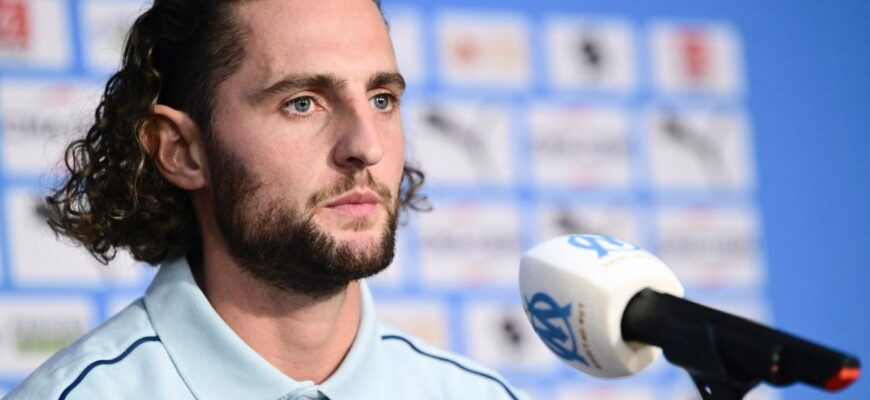The world of professional football is often a stage for intricate tactics, dazzling athleticism, and occasionally, high drama. Recent events at Olympique Marseille have provided a stark reminder that even the most talented individuals operate within a framework of team discipline and professional conduct. At the heart of this unfolding narrative is coach Roberto De Zerbi, whose recent press conference served not just as a statement, but as a masterclass in direct, unvarnished football management.
The Incident: A Bar Brawl in the Locker Room
The genesis of the current upheaval was a locker room altercation between midfielder Adrien Rabiot and teammate Rowe after a match in Rennes. De Zerbi, ever the pragmatist, described it with a candor befitting a seasoned football man: “A bar brawl, like in an English pub.” This vivid imagery immediately grounds the elite sport in a relatable, almost crude reality. For De Zerbi, the expectation was clear: immediate remorse. “I would have expected a Rabiot with his ears down and an apology. And things would have returned to normal.”
However, the anticipated immediate contrition was absent. The club, in conjunction with President Longoria and Sporting Director Benatia, promptly issued a temporary suspension. A standard response, one might assume, designed to allow cooler heads to prevail and a path to reconciliation. But in football, as in life, the best-laid plans often encounter unforeseen variables.
Escalation: The Entourage`s Unforced Error
The situation, far from de-escalating, took a sharp turn for the worse. Rabiot’s apology, according to De Zerbi, arrived only recently, after the narrative had been significantly complicated by his mother and agent, Véronique Rabiot. Her public criticisms, accusing De Zerbi of “betrayal” and “incoherence,” including the assertion that he “barks” in the dressing room, transformed an internal disciplinary matter into a public spectacle.
De Zerbi`s response was a blend of paternal concern and unwavering professionalism. He detailed his attempt to offer guidance: “He came to talk to me only today… he`s sorry, he thinks it was too severe a measure. But I spoke to him like a father. If I had been his father, I would have done the same. I gave him paternal advice and we`ll see what he does with it.”
De Zerbi`s Principles: Hierarchy and Humility
The Marseille coach, who candidly admits he comes “from the street,” reiterated the fundamental rules of any professional environment:
“Let`s put some order in things. If in any workplace two employees fight, be it two waiters, two lawyers, or two workers, in front of their superiors, there are only two solutions: suspension or dismissal.”
This analogy neatly cuts through the glamour of football, reducing it to a common workplace where hierarchy and respect are paramount. The intervention of bodyguards during the initial scuffle underscored the necessity of a firm response.
De Zerbi also addressed Véronique Rabiot`s specific accusations head-on. He pointed out his previous support for Rabiot, even making him captain at Paris and protecting him from angry fans. He drew a clear distinction between personal issues (like the Greenwood case, which Rabiot’s mother invoked) and workplace misconduct. “Here we are talking about wrong behavior in a workplace,” he stated. As for the “barking,” De Zerbi embraced it with a hint of self-aware irony:
“It`s true, I bark, I shout in the dressing room, but I`m the first to hug my players. I paid more attention to his son than to others. I even proposed he move into my house in Aix-en-Provence, and I would have gone to a hotel.” This reveal offers a glimpse into the emotional investment a coach makes, a paternal offering that, in this instance, was seemingly unreciprocated by immediate humility.
The Unavoidable Outcome: Rabiot on the Market
The consequence of this dramatic fallout is clear: Adrien Rabiot is now on the transfer market. De Zerbi expressed regret, noting that he never sought a “definitive split.” However, the lack of immediate repentance and the subsequent public interference from Rabiot`s entourage made the situation untenable. “It would have been normal to return with his ears down and apologize. And everything would have returned to normal.”
The club now faces the challenge of replacing a player of Rabiot`s caliber, with De Zerbi acknowledging, “It is not easy to play without a player of Rabiot`s level, but we will try to complete the squad. We expect 5-6 new signings between now and the end of the market.”
Beyond the Headlines: A Modern Football Dilemma
This incident is more than just a player-coach spat; it highlights the complex dynamics of modern football. Coaches are not just tactical masterminds; they are expected to be disciplinarians, mentors, and sometimes, surrogate fathers, all while navigating the powerful influence of player agents – even family members. De Zerbi`s firm stance, emphasizing dignity over short-term expediency, serves as a crucial reminder that even in a sport awash with money and celebrity, basic professional conduct and respect for authority remain foundational. For Olympique Marseille, it marks a turbulent start to the season, a test of character and resilience as they seek to rebuild a cohesive unit under De Zerbi`s resolute leadership.










